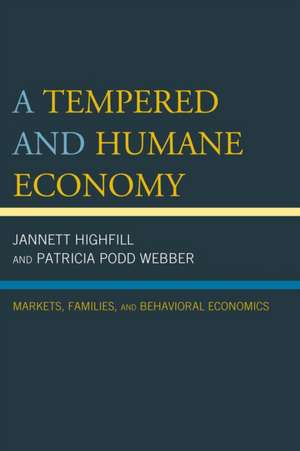Tempered and Humane Economy
Autor Jannett Highfill, Patricia Podd Webberen Limba Engleză Paperback – 20 apr 2016
Preț: 419.29 lei
Nou
Puncte Express: 629
Preț estimativ în valută:
80.26€ • 87.21$ • 67.46£
80.26€ • 87.21$ • 67.46£
Carte tipărită la comandă
Livrare economică 21 aprilie-05 mai
Preluare comenzi: 021 569.72.76
Specificații
ISBN-13: 9780739194553
ISBN-10: 0739194550
Pagini: 174
Dimensiuni: 228 x 154 x 16 mm
Greutate: 0.2 kg
Editura: Rowman & Littlefield
ISBN-10: 0739194550
Pagini: 174
Dimensiuni: 228 x 154 x 16 mm
Greutate: 0.2 kg
Editura: Rowman & Littlefield
Cuprins
Table of Contents
I. Each Person, Each Family 000
Chapter 1: The Wisdom of Families000
Chapter 2: Elanäs Family Network 000
Chapter 3: It¿s Complicated, Investing in Yourself 000
Chapter 4: ¿It¿s Not Fair¿000
Chapter 5: Talk the Walk 000
Chapter 6: What¿s Luck Got To Do With It?000
Chapter 7: The Wisdom of Families¿Supporting Each Other¿s Decisions 000
II. The Big Picture: Investment Decisions in Context 000
Chapter 8: The Wisdom of Families¿Democracy is Learned at Home 000
Chapter 9: Investing in Strangers 000
Chapter 10: The Wisdom of Families¿The Most Important Investment 000
Chapter 11: Education¿It¿s a Social Contract 000
Chapter 12: Mother Jones Would be Pretty Happy 000
Chapter 13: The Best Nets Are More Holes Than Rope 000
III. Thinking Harder: Does ¿Help¿ Really Help? 000
Chapter 14: The Wisdom of Families¿Good Intentions and Unintended Consequences 000
Chapter 15: Tough Love for the Poor 000
Chapter 16: Tough Love for the Rich 000
Chapter 17: The Wisdom of Families¿Avoiding Double Standards 000
IV. Prosperity is an Enormous Achievement 000
Chapter 18: Warts and All, We Are a Big Rich Country 000
Chapter 19: Inclusive vs. Extractive Institutions¿Thinking Globally 000
Chapter 20: When Markets Produce 000
Chapter 21: Markets and Meaningful Work 000
V. Tempering Markets with Government Policy 000
Chapter 22: The Government We Make 000
Chapter 23: When the Challenge is Healthcare 000
VI. Looking to the Future 000
Chapter 24: The Wisdom of Families¿Challenge and Aspiration 000
Chapter 25: Tempered Optimism, Humane Prosperity, 000
Appendix 1: When You Have Enough to Share, Share Wisely000
Appendix 2: Concrete Suggestions for Sharing 000
Acknowledgments 000
Bibliography 000
Index 000
Notă biografică
Jannett Highfill is a poet and economist living in Wichita Kansas. She has two poetry chapbooks, A Constitution of Silence and Light Blessings Drifting Together. Her poetry is especially indebted to the Grandview Hotel Poets of Peoria Illinois as well as her many colleagues and friends at Bradley University. She is coauthor of A Tempered and Humane Economy: Markets, Families, and Behavioral Economics.
Descriere
This book challenges economists to bring the insights of behavioral economics into their reflections on the macroeconomy as well as on individual decision-making and it challenges everyone, economist and layperson alike, to bring the wisdom they learn from their families out into the larger economic world.
